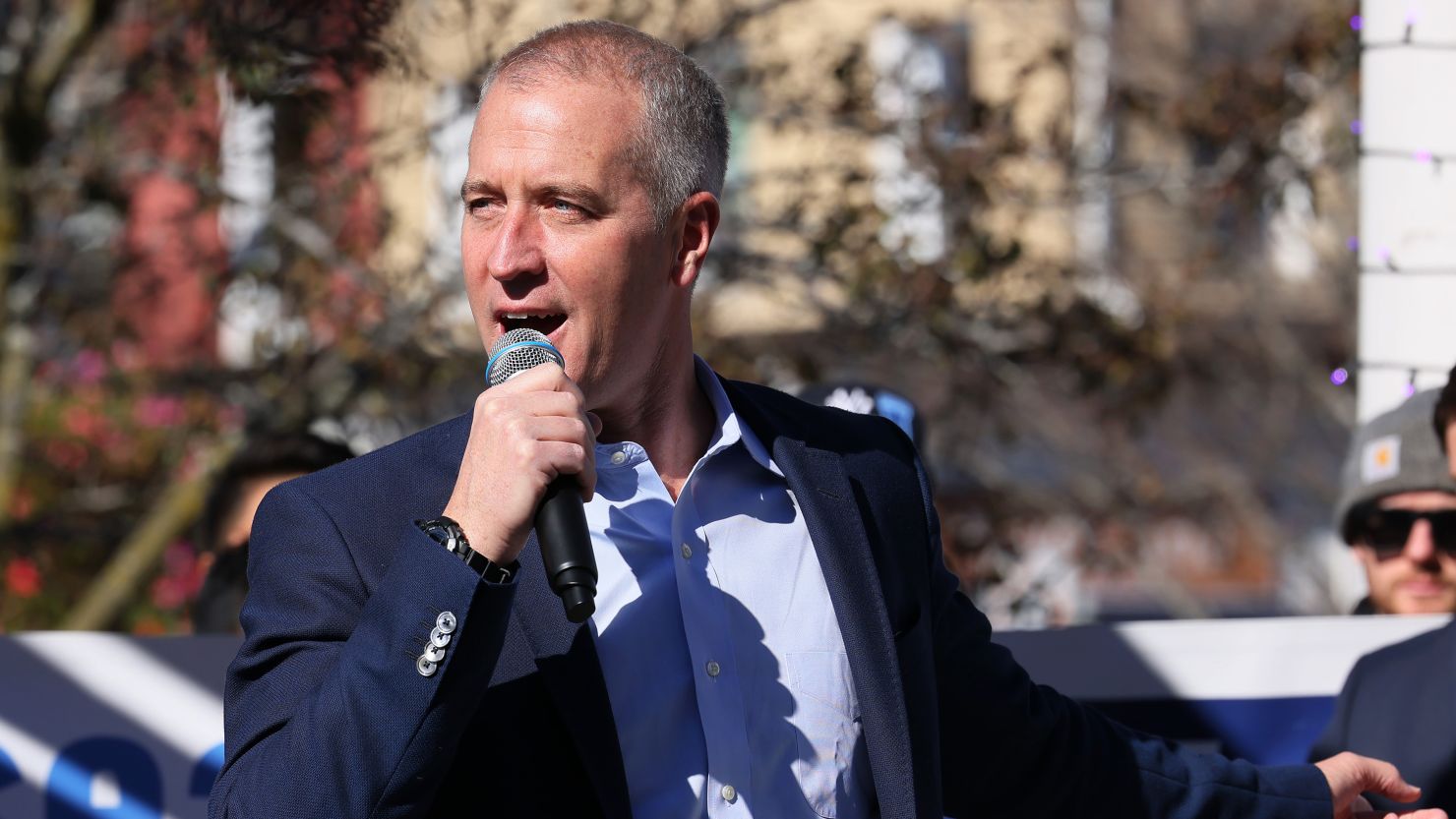Earlier this year, when New York’s redrawn House district lines were handed down after months of squabbling and legal challenges, Rep. Sean Patrick Maloney made his move.
The Democrat announced he would run for reelection in the Lower Hudson Valley’s 17th Congressional District, home to his residence in Cold Spring, but where only about 30% of his current constituents live. The decision was pilloried by some on the left, who said that by running for a seat seen as safe for Democrats, Maloney was placing his own fortunes ahead of the majority he’s charged to protect as chair of the party’s House campaign arm.
More on House races
Maloney dismissed the criticism, insisting that even in the new district, which President Joe Biden would have won by roughly 10 points in 2020, he would face a heavy lift in November.
If anyone doubted him then, they’ve been quiet over the last couple of months with Maloney now locked in a tight race.
His challenge mirrors those facing so many other Democrats in New York and around the country. Republicans have seized on concerns over rising inflation and public safety, their message juiced by Biden’s low approval ratings and widespread frustration and angst over a pandemic that, more than two years after it began, continues to wreak havoc on the economy. If Maloney falls, not only will Republicans be able to boast about taking down the head of the Democratic Congressional Campaign Committee in his own backyard, but they will almost surely be on their way to an Election Day evisceration of Democrats’ House majority.
Maloney’s GOP opponent, state Assemblyman Mike Lawler, has benefited from a barrage of outside spending by Republican groups, led by the Congressional Leadership Fund, the main House GOP super PAC, which has poured $6 million into the race, $4 million of it in the final few weeks. Their spending prompted a response from the DCCC – which pitched in more than $600,000, a move Maloney said he recused himself from – and a separate Maloney-aligned group.
As appealing as the seat might be to Republicans in any election cycle, the opportunity to oust Maloney has attracted an additional layer of interest and investment in Lawler’s campaign.
“Having him run against the DCCC chair has helped him garner the resources. Because it definitely is an appetizing race, just because it is against the DCCC Chair,” said Yorktown’s supervisor, Republican Matthew Slater, a longtime friend and close ally of Lawler. “If Mike can defeat the chairman of the DCCC, I think that has a ripple effect across the country. And that’s what I think the end result is going to be.”
Rockland County Democratic Party chair John Gromada told CNN that Maloney’s title, and the symbolism that comes with it, has been a “huge hindrance” in the race.
“The only reason this race is close is because of the $9 million, or whatever it is, that was pumped into all these negative ads. It’s just insane. It’s an artillery,” Gromada said. “I don’t think it would be close at all if it weren’t for all that freaking money.”
For his part, Maloney is careful not to be seen as wallowing or whining. This is, after all, the race he sought, even if meant effectively pushing fellow Democratic Rep. Mondaire Jones, whose district includes Rockland County, off the map. (Jones later ran for a redrawn New York City district but lost in the primary.)
“Embrace the suck,” Maloney said, invoking old military slang to describe his and his Democratic colleagues’ predicament. “Life isn’t fair. Politics isn’t fair. You get the hand you’re dealt and you make something out of it. And that’s what we’re going to do.”
Introducing … Sean Patrick Maloney
Maloney’s decision to shift districts also meant that he needed to win over voters in Rockland County, an ethnically diverse area with an influential Orthodox Jewish community that has occasionally come into conflict with state Democratic leadership.
“We’ve tried to introduce (Maloney) more to the concerns of the county, and many of them overlap with what he’s been dealing with elsewhere,” Gromada said. “It’s been somewhat of a learning curve, I think, for the campaign. But they have made a huge effort to get out to every part of our county.”
Maloney, New York’s first out gay member of Congress, faces many of the same attacks aimed at Democrats in battleground districts around the country. Lawler, a former political consultant who holds a Rockland County state Assembly seat, is relentlessly on message – and his argument is clear.
“You look at this election, and the issues that folks are most focused on are the economy and crime. And on both fronts, the Democrats own it,” he told CNN at a restaurant in Pearl River. “For the first time in our nation’s history, (Democrats) own everything in Washington, Albany, and New York City all at once.”
Asked whom he would model himself after if he won the election, Lawler pointed to Republican former Rep. Peter King, an often-combative longtime congressman from Long Island, who was widely regarded as a fierce advocate for New York. His support for a law to benefit sick 9/11 first responders and for aid in the aftermath of 2012’s Superstorm Sandy sometimes came in defiance of Republican leadership.
“King really became like the third US senator from New York because of his profile, because of his seriousness in addressing the issues,” Lawler said. “My objective is not to poke people in the eye, but to make sure that my constituents and the people that elected me are represented. This is a district with 70,000 more Democrats than Republicans.”
‘MAGA Mike’?
Maloney and his allies have painted a very different portrait of Lawler, whom they sometimes call “MAGA Mike,” arguing that his middle-of-the-road rhetoric and pledges to work across the aisle are, if not disingenuous, then sure to dissipate in a House conference led by allies of former President Donald Trump such as Kevin McCarthy, the potential future House speaker, and increasingly influential New York Rep. Elise Stefanik. (Lawler does not dispute Biden’s 2020 election victory and said he would have voted to certify the results in Congress.)
His messaging on crime has rankled many Democrats, especially in the New York City suburbs, home to some of the most statistically safe communities in the country, who say Lawler and other Republicans are fearmongering.
“When you look at this election, what you’re talking about is a competition between two styles of politics,” Maloney said. “One that counts on people having common sense and putting some value on fixing problems versus a style that just says, ‘You know, let me make you angry. Let me play into your worst fears and your darkest thoughts.’”
On “CNN This Morning” on Monday, Lawler again argued that Democrats were underplaying voters’ concerns about crime.
“When people are saying they don’t feel safe,” Lawler said, “it’s because they’re not safe.”
Lawler’s opposition to abortion – he supports exceptions for rape, incest and threats to the life of the mother – has been another target for Democrats. Lawler has sought to defuse that criticism by insisting that his position is personal and that he would not vote for any federal restrictions, calling it an issue to be decided at the state level.
As for voters who name abortion rights as their top issue of concern, Lawler reasons, they probably have not considered casting a ballot for him anyway – a conclusion that he said calls into question Democrats’ broader strategy, here and in other swing districts.
“Their campaign has been about Donald Trump and abortion. And that’s not where voters are, even in New York,” Lawler said. “People are hyper-focused on the cost of living, public safety, children’s education.”
Democrats, including Maloney, have also sought to tie Lawler to an antisemitic video posted on the Rockland County Republican Party’s Facebook page in 2019. When confronted by Maloney over the clip – which attacks an Orthodox legislator – during a debate, Lawler denounced it and called the allegation that he was involved in its production a “ridiculous, personal attack.”
“I’ve never seen a guy stand up there with such ease, smile on his face, and just lie,” Lawler said of Maloney. “To me, you do that when you’re desperate, when you’re flailing. And obviously, as we’ve seen with the amount of people coming in to try and save him at the end here, he’s in panic mode.”
Former President Bill Clinton has been among those to pitch in some kind words for Maloney, whose career in politics started on Clinton’s first presidential campaign. He eventually served as the former president’s White House staff secretary before launching his own political career.
Last weekend, here in Nyack, Clinton made a rare campaign trail appearance to praise Maloney and Democrats in Washington.
“These people took office in a terrible time, and they’re making it better. And we need to stick up for them,” Clinton said.
About an hour earlier, during his interview with CNN, Maloney offered a similar closing argument.
“My dad used to say, ‘Any jackass can kick down a barn. It takes a carpenter to build one,’” he said, channeling an adage more frequently attributed to mid-20th century House Speaker Sam Rayburn. “We’re the carpenters. That can be a harder lane.”









